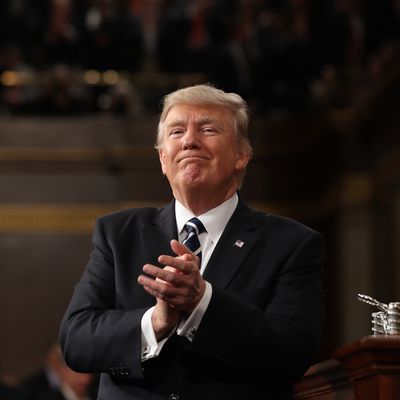
Last night, the president of the United States stood up before Congress and said “We must honestly acknowledge the circumstances we inherited” — and then, in his very next sentence, implied that “94 million Americans” are involuntarily unemployed.
This was one of many obvious falsehoods in a speech brimming with platitudes but bereft of new ideas or policy details. By the end of Trump’s address, he had touted the creation of a new government office called “Victims of Immigration Crime Engagement” — which appears to have little purpose beyond encouraging Americans to associate immigrants with crime — but had offered no new information on his plans for Obamacare repeal.
“One of the best speeches in that setting I have heard any president give,” Fox News’ Chris Wallace said, shortly after Trump stepped down from the dais.
And Wallace was not alone. There was broad consensus among the “enemies of the American people” that Trump had turned in a praiseworthy performance.
“In his first address to Congress, Trump wins high marks for his steady, muscular tone,” declared the Washington Post. “Was this the Trump that could win in 2020?” a headline atop Politico’s homepage asked.
Even Racheal Maddow conceded the political efficacy of Trump’s remarks, saying, “This will be a very well-received speech.”
Her fellow left-wing pundit Van Jones went several steps further, offering laudatory praise for the substance of a section of the speech.
One of Trump’s first acts as commander-in-chief had been to order the raid of a compound in Yemen — an endeavor that (reportedly) generated no useful intelligence, while claiming the lives of many small children and a Navy SEAL named Ryan Owens. Earlier in the week, Trump had disclaimed responsibility for the raid, telling Fox News that it was his generals who had “lost Ryan.” His administration had previously argued that anyone who questioned the success of the raid did a disservice to Owens’s memory — a claim that did not sit well with the SEAL’s bereaved father.
But on Tuesday night, Trump repurposed his deadly blunder into a piece of uplifting political theater. As cameras fixed on Owens’s weeping widow in the audience, the president assured her that her husband’s mission had been a great success — and that “Ryan’s legacy is etched into eternity.”
Jones was overcome.
“That was one of the most extraordinary moments you have ever seen in American politics, period,” he effused on CNN. “And he did something extraordinary. And for people who have been hoping that he would become unifying, hoping that he might find some way to become presidential, they should be happy with that moment … he did something tonight that you cannot take away from him. He became president of the United States.”
It’s unclear why Jones believes it was “extraordinary” for a president to use the memory of a fallen soldier as a shield against criticism of his foreign-policy mistakes. But he wasn’t the only member of the chattering classes to commend the utterly mundane.
If you’re taken aback by the press’s enthusiasm for Trump’s address, then you and the Trump administration see eye to eye (on one thing, at least).
What, then, explains the warmth of the punditocracy?
One answer is that the mainstream press does not like being the “opposition party.” The past year has provoked a crisis of faith in the church of “both sides do it.” But while the ideal of “balance” in political coverage has become ever more difficult to sustain philosophically, it remains a convenient value to uphold. Trump’s frequent failures to respect the norms of liberal democracy — and/or common decency — have forced many news outlets into a stridently adversarial posture. But relentlessly negative coverage of the president undermines access to the administration, and risks alienating a large swath of potential readers and viewers. This leaves straight-news outlets ravenous for an excuse to highlight something positive about the president, thereby reaffirming their credibility as neutral umpires.
And, to be fair, Trump’s speech did offer some solid excuses to do just that. The president began his speech by calling for unity in the face of anti-Semitism and bigotry — and ended it without ever having mentioned “fake news,” Hillary Clinton, or Vladimir Putin’s more admirable qualities.
The president’s address to Congress is supposed to be a largely empty, reassuring spectacle. Trump has conditioned the media to expect him to twist such events into theater of the grotesque. But on Tuesday night, he provided a (mostly) convincing facsimile of normality. And one that could very plausibly prove politically beneficial.
This is a break in the pattern that Trump has established. Which makes it news. So, even if the media had no incentive to give the president a cookie, it would be difficult to convey the key takeaways from his speech without engaging in “low-barism.”
And while some pundits and headline writers deployed baseless hyperbole, most of the coverage in mainstream print outlets highlighted the speech’s lack of substance, while assessments of the speech in the op-ed sections of the New York Times and Washington Post were mostly critical.
Which is to say: If the media has a low bar for Trump, he has a low bar for what constitutes laudatory media coverage. The president delayed the signing of a new executive order Wednesday so as not to interrupt the conversation about his speech. And on Wednesday morning, he signed onto Twitter for a kind of curtain call.
It’s worth noting that the media and Trump are, in one sense, unnatural enemies. The mogul’s candidacy and election were the two best things to happen to America’s beleaguered news business in a long, long time. And Trump owes nearly everything he has — in politics and in commerce — to the media. Where would the president be had tabloids, reality-show producers, and cable-news executives never decided that he was fascinating? And that fascination is wholly requited: Cable-news channels have never had a president more passionately invested in what they do.
This comity between the president and the Fourth Estate is unlikely to last. But the whole episode offers a glimpse of the kind of relationship Trump could have with the media, were he not such a needy and abusive partner.






























